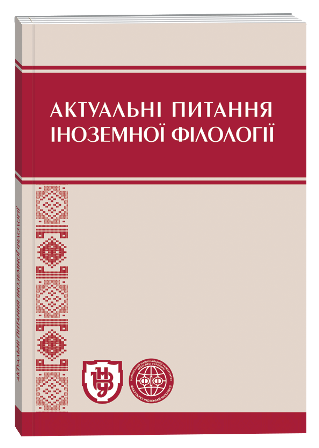VERBALISATION OF THE CONCEPT UKRAINE IN THE ENGLISH SPEECHES OF THE UKRAINIAN PRESIDENT PETRO POROSHENKO
Keywords:
political discourse, concept, word-nominators of the concept, ideographic parametrization, frame, frame analysisAbstract
The article is devoted to the study of the concept UKRAINE in the speeches of the President of Ukraine. The material studied were the texts of the English speeches of the Ukrainian President Petro Poroshenko. The topicality of the investigation is due to the constant growth of the scientific interest in linguistics towards the concept in general and the concept of Ukraine in particular. The paper outlines in brief the main functions and features of the political discourse, as the speeches of the President are a part of the political discourse. The definitions of the concept are proposed in terms of linguocognitive and linguocultural approaches; the name of the concept (UKRAINE) is defined, the key words-nominators of this concept in the discourse units under investigation are identified: Ukraine’s... / ...of Ukraine, Ukrainian, Ukrainians, Ukrainian people, Ukrainian State, we, nation, country, home; the ideographic parametrization of the linguocultural concept UKRAINE is made, it is defined that the frames of the concept under study involve slots that show spatial and territorial, temporal, role characteristics, characteristics of will expression and state position. The slots of the subject frame of the concept UKRAINE are filled, based on the principles of cognitive linguistics when frames are used to construct conceptual structures: UKRAINE is unique, UKRAINE is free, peaceful, integral; UKRAINE exists with broken sovereignty, with a partially occupied territory, sufferinf from Russian aggression; UKRAINE exists in Europe, the world, exists now, then, always. In the long term, we consider it important to complete the frame analysis, filling the slots of taxonomic, presentive, posessive, actional and comparative frames.
References
Воркачёв С. Г. Счастье как лингвокультурный концепт / С. Г. Воркачёв. – М. : ИТДГК «Гнозис», 2004. – 236 с.
Жаботинская С. А. Лексическое значение: принципы построения концептуальной сети / С. А. Жаботинская // Pstyga, A. (red.) Slovo z perspektywy jezykoznawcy s tlumacza. – Gdansk : Widawnictwo Universytetu Gdanskiego, 2005. – S. 53–62
Краткий словарь когнитивных терминов / Е. С. Кубрякова, В. З. Демьянков, Ю. Г. Панкрац, Л. Г. Лузина. – М. : Моск. гос. ун-т, 1996. – 245 с.
Мудраченко Т. Б. Актуалізація концепту УКРАЇНА в сучасному англомовному газетному дискурсі : дис. … канд. філол. наук : 10.02.04 «Гермагнські мови»/ Мудраченко Тетяна Борисівна. – Х. : Харк. нац. ун-т ім. В. Н. Каразіна, 2013. – 200 с.
Остапчук В. Концепт України у творчості Т. Шевченка / В. Остапчук // Київські полоністичні студії. – 2015. – Т. 26. – С. 154–158.
Степанов Ю. С. Константы: словарь русской культуры. – М. : Академический проект, 2001. – 990 с.
Телия В. Н. Русская фразеология. Семантический, прагматический и лингвокультурологический аспекты. – М. : Языки русской культуры, 1996. – 288 с.
Graber, D. A. Political languages. In D. Nimmo and K. Sanders (eds), Handbook of Political Communication / D. A. Graber. – Beverly Hills : Sage, 1981. – Р. 195–224.
Downloads
Published
How to Cite
Issue
Section
License
Copyright (c) 2025 Юлія Кишеня

This work is licensed under a Creative Commons Attribution 4.0 International License.







